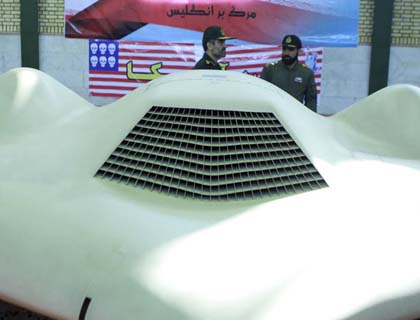After, Iran was able to capture a US drone - which it accused of spying on its nuclear-program sites – it warned the Afghan government, on Thursday, not to permit US to operate such surveillance flights. Any further flights would be regarded as a hostile act, the Iranian foreign minister, Ali Akbar Salehi, said in an interview with Iran's official Islamic Republic News Agency. "We have called on the Afghan government to seriously pursue the case, and under no circumstances to let such events happen again, as such events will be regarded as unfriendly," Mr. Salehi said.
He called the drone flight a "hostile and aggressive act." Seemingly, the Iranian government is trying to involve Afghanistan in the matter by holding Afghanistan responsible for all actions US takes using the Afghan soil. But what can the Karzai administration do?
A new episode of the US-Iran relations began when earlier this month Iran downed a US drone - a sophisticated, bat-winged RQ-170 model with radar-evading features. The drone, Iran says, was captured after its navigating system was electronically attacked.
The US President Obama has demanded the Iran to hand back the drone. Mr. Obama on Monday acknowledged that Iran was holding the reconnaissance drone by saying: "We've asked for it back. We'll see how the Iranians respond." But Iran has been dismissing Obama's request.
Defence Minister of Iran, Ahmad Vahidi said on Tuesday the captured drone is now the property of the Islamic republic "The American espionage drone is now Iran's property, and our country will decide what steps to take regarding it," Vahidi was quoted as saying by ISNA news agency.
The US should not only be demanding Iran to return the drone but also be concerned about what uses Iran can make from it. This could be even worse for US officials, who were already worried with the apparent lack of damage to the drone, as it would not only suggest Iran can grant access to a fully intact stealth drone to nations like Russia and China, but that the drones are also vulnerable to such tricks in the future.
Can the Afghan government stop drone flights the US is making by using this country? There is has been no comment from Afghan side on the capturing of the US drone by Iran. The Afghan government that has been pronouncing its relations with Iran as very friendly has signaled no reaction to the warning of Iranian government.
However, US Defense Secretary Leon E. Panetta, visiting with Afghanistan's president, Hamid Karzai, in Kabul on 14 December, said that surveillance flights over Iran would continue despite the loss of the drone. Mr. Karzai was more circumspect, saying Afghanistan wanted "the best of relations" with all its neighbors.
One of the serious and at the same time legitimate concerns of our neighboring countries has been utilization of Afghan soil against them. In respond to that, Hamid Karzai has repeatedly said no one would be permitted to utilize Afghanistan against any other country. Despite that, our neighbors – especially Iran and Pakistan – fear the US long term presence in Afghanistan and deem it dangerous to their national sovereignty.
The same fear has caused Iran to oppose the Western countries presence in Afghanistan. The US government accuses Iran for giving a hand to Taliban and other terrorists' groups. It deems that Iranian intelligence provide training, equipment and financial support the insurgents.
Afghan analysts, on the hand, blame Iran for playing a double game in Afghanistan. According to them, Iran at one hand provides funds to the Afghan government and at the other supports the Taliban. That forms the reasons for silence of Afghan government over the meddling of Iran in Afghanistan's internal affairs. Now that the US spy drone has fallen in the hands of Iran. Iran is using this opportunity to prove that they are right about the US intentions by remaining in Afghanistan.
If Iran desires the Western troops to leave Afghanistan and relieve itself from the fear it is having, then it has to come forward and cooperate sincerely with Afghan government and the international community in countering the insurgency. Stability and prosperity in Afghanistan would mean stability in the region. The Islamic Republic must stop backing the insurgents groups. If not, war will continue and it would receive harm either intentionally and unintentionally.
On the other hand, the Karzai administration is not in a position to be able to dictate the US and its allies about their functions in Afghanistan. In other words, Afghan government is still in quite a pathetic condition and is not the sole decision maker about the future of Afghanistan. Until and unless, the Afghan administration formalizes the western presence in Afghanistan, it cannot, independently, make commitments to its neighbors about the utilization of Afghan soil against them.
The expected long-term agreement between Afghanistan and the US is going to clarify many aspects of Afghan-US relationship. The participants of the Loya Jirga that was held last month supported the long-term deal with America but on certain conditions. Among the conditions also was: Afghanistan should not be used by US to against any of neighboring or regional countries.
But the deal is yet to be signed. Until then, it would be difficult for Karzai administration to respond to the wants and concerns of our neighboring countries. Therefore, Iran government should not expect any satisfactory response from its Afghan counterpart on the issues of surveillance flights from Afghanistan.

